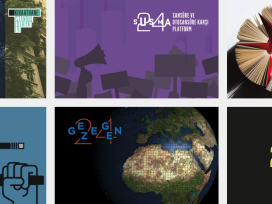Cautionary tales
Watch the 31st European Meeting of Cultural Journals
A Russian, a Turk and a Hungarian, all journalists, walk into a bar … well, an online talk, actually. Irina Borogan, Ece Temelkuran and György Kerényi spoke about censorship and repression, the impossibility of exile and the performance of care.
Censorship of the media may have become increasingly devious and subtle, but it’s still easy to spot: political persecution, withdrawal of a media licence or administrative and financial pressure all restrict press freedom. However, the personal risks that journalists and writers face in an era of authoritarian populism are manifold and more pervasive than outright censorship.
György Kerényi, one of our conversation partners, is a journalist at Radio Free Europe Hungary – the legendary broadcaster reanimated after thirty years to address diminishing press freedom in eastern Europe. Kerényi has founded and led many media organizations, serving as editor-in-chief to the Hungarian public broadcaster Kossuth Rádió until Fidesz’s restrictive media regulation and the reshaping of media authorities forced him to leave.
Kerényi considered media work ethics. Journalists, who are trained not to choose sides in political competition and value impartiality as a cornerstone of their profession, have a hard time maintaining neutrality when the political middle ground is eliminated. Impartiality becomes a harder value to keep when, as historian Timothy Garton Ash notes, new authoritarians treat democratic procedures as a Potemkin facade.
Eurozine’s returning contributor Irina Borogan, journalist and editor of agentura.ru, and co-author of the book The New Nobility: The restoration of Russia’s security state and the enduring legacy of the KGB, also joined the discussion. As a long-term investigator of the Russian secret service, Borogan is certainly no neophyte when it comes to working under political pressure. After the media license of Agentura was recently withdrawn under disquieting circumstances, Borogan decided to leave Moscow and is now a fellow at King’s College London. She reflected on Russia’s post-authoritarian heritage and how journalism is affected when sources and subjects live hundreds of kilometres away.
Ece Temelkuran is a Turkish writer and journalist, author of many books, including How to Lose a Country: The 7 steps from democracy to dictatorship. She took issue with the expectations projected onto writers and journalists who leave their countries to break free of authoritarian regimes. Western discourse tends to distort and oversimplify their experiences to fit into anthropologically charged conceptions of eastern Europe and Asia.
In the western collective imagination, Turkey often ends up overlapping with the figure of Erdoğan, Hungary with Orbán and Russia with Putin. This, in turn, reduces the complex experiences of non-aligned thinkers to their relationship with the very autocrats they oppose. In recent months, the debate over Russia’s Sputnik V vaccine has provided another example of how western powers do not seem capable of moving beyond Cold War stereotypes.
In this context, expressing solidarity with journalists and writers who suffer political pressure at home can become a way of feeling reassured of one’s own liberalism. The very act of showing interest in their stories can be superficial and performative, turning into patronizing commiseration, a form of pressure in itself, Temelkuran warned.
At stake is not only the personal and professional identity of writers and journalists who have left their country of origin but also their ability to convey the disturbing easiness of authoritarian drifts – a cautionary tale which, at any latitude, is far too relatable to be reassuring.
Published 28 June 2021
Original in English
First published by Eurozine
© Eurozine
PDF/PRINTIn collaboration with
Newsletter
Subscribe to know what’s worth thinking about.
Related Articles

Afraid of falling behind, businesses are rushing to implement AI – even if their industries might not be ready for it. In this Standard Time episode, we explore generative AI’s impact on media and journalism, and ask whether its making us smarter or dumber.

Republic transformed
Politics and media in France
The successful campaign of the Republican Front against the mainstreaming of the far-right proved that France’s ultra-conservative media, though on the ascendant, are still not hegemonic.






